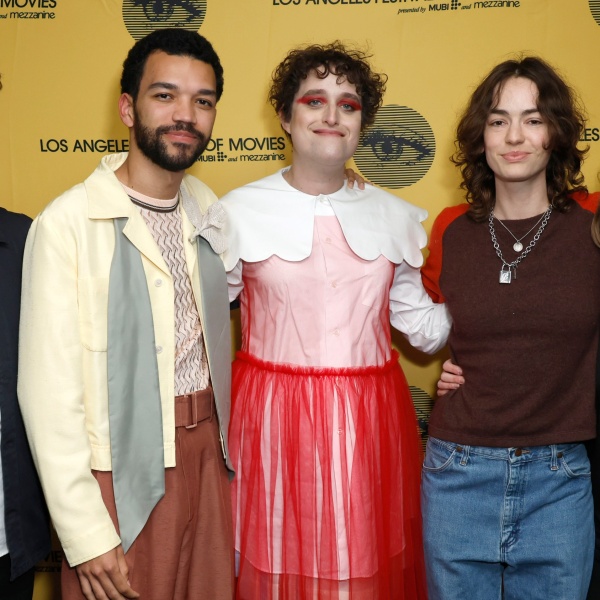Joanna Arnow’s feature-length film debut “The Feeling That the Time for Doing Something Has Passed” is a spiky, hilarious look at the life of Ann (Arnow), a thirty-something living in Brooklyn, working a corporate job, dealing with her meddlesome family, and passing the time in her casually longterm BDSM relationship with an older man.
Arnow’s previous work, including the shorts “Bad at Dancing,” which won a Berlinale Silver Bear Jury Prize in 2015, and “I hate myself :).” Both explore similar themes of loneliness and sexuality through an autofiction lens. But they also showcase Arnow’s specific comedic insight into everyday, mundane things that might not seem funny at first but are downright gut-busting in her hands.
“The Feeling That the Time” premiered at Cannes Directors’ Fortnight in 2023 before Magnolia Pictures acquired it out of the festival, with Sean Baker executive producing.
The first inspiration for “The Feeling That the Time” was expanding on that exact sense of humor, she told IndieWire. “I’ve always been interested in writing and exploring concise humor, and so I wanted to push further with that. I got the idea to write lots of very short scenes that draw on personal experience, and I was interested in exploring the humor of everyday situations and the comedy of how we talk and relate to each other.”
She finds humor in Ann’s family life — her sister’s judgment about her “casual” dating life, going on vacation with her parents just to sit around and have them talk at you. Adding to the layers of the film, Arnow’s parents play her parents in the film.
“I don’t think they know how good they are as actors, and I hope it stays that way so I don’t have to go through their reps next time,” she said. But it’s all part of how her personal experience permeates the film.
“I consider this film to be autofiction, so while it draws on personal experience, it’s not autobiographical,” Arnow said. “I am really proud of the ways that it draws on personal experience and did things like casting my parents to play the parents because it gives me a chance to dig deeper with the humor and mine my experience in a way that I hope will make the film one that resonates.”
For anyone who’s worked in a late-stage capitalist office job, Arnow’s depiction of Ann’s workplace is hilarious and harrowing to anyone who has heard the words “restructuring” at an all-hands meeting. She works at a pretty nondescript office — filled with buzzwords and five-year plans that have no grist behind them. Arnow excels at laying bare the contradictory absurdities of the corporate world. Elsewhere, a hyper-specific running joke throughout the film finds Ann preparing her prepackaged meals from a pouch. Arnow looks for the humor in things where it might not be there at first glance.

“There’s so much humor all around us in everyday life, and when you take a step back, everything just becomes funny if you look at it from a distance,” she said. “That’s partly why I like to film in a long take to see the full absurdity of the context of the situation. This is cheesy, but I feel like this film is my love song to the world being funny and artistically exciting when we step back and look at it.”
Lest we forget the BDSM of it all, Ann’s relationships are portrayed as funny, discomfiting, and poignant. The film’s structure chronologically breaks up Ann’s life through vignettes of her relationships, and that’s where the title comes in.
“The film is about and wrestling with relationships and sexuality itself. Because it is so relationship-focused, I wanted to divide it up with these chapter headings based on the relationships that they focus on,” Arnow said. “Of course, the film is about more than these relationships, but I like that, in some ways, this film isn’t structured so neatly. I wanted to reflect the messiness of life and our subjective experience.”
While we see other parts of Ann’s life, we learn a lot about her through the relationships she explores. They range from the casual — a dom composer to a dom who wants her to dress up as a “fuck pig” while she masturbates on his rooftop with bells on. She has a sweet romance with Chris (Babak Tafti), who doesn’t practice BDSM but gives her insight into the other types of relationships she could have.
Arnow wanted to show BDSM in a different light compared to how it’s often represented onscreen. “There’s a lot of misconceptions about BDSM and what it means to be submissive. I really wanted to portray [a submissive] as an active participant in the planning of the BDSM sessions to counter that part because, in my experience, people involved in BDSM have to be triply communicative and respectful,” she said.

She continued, “I was interested in showing [BDSM] with a sensational and humorous lens because I think some of the ways that sex scenes are depicted are a little bit overly sensational and not true to life. One of the reasons sexuality and relationships interest me is because there’s so much vulnerability and humanness in the ways we interact with each other and it says so much about character. I wanted to explore BDSM through this comedic lens.”
Ann’s most consistent yet still casual BDSM relationship is her long-term one with an older man, Allen (Scott Cohen), whose chapter opens the film and is seen throughout. Some of the relationship with Allen is spent in his bed, with him fully clothed and Ann completely naked — talking about what she likes, him asking her where she went to college for the millionth time, or participating in various BDSM acts.
Their relationship feels worn in; clearly, they are two people who’ve spent a great deal of time with one another. Cohen is a sternly deadpan presence and unafraid to go there alongside Arnow in the depiction of Ann and Allen’s relationship. After Pierce Varous, a producer on the film, suggested Cohen as a potential fit for Allen, Arnow knew he would be able to portray the humor necessary for the character.
Much of the humor in the Ann and Allen relationship is found in their conversation and also the BDSM scenarios they play out, much of which show Ann’s power in being submissive. Arnow specifically wanted to portray how Ann gets power from her BDSM relationships.
“Being submissive is an inherently powerful thing and somewhat misunderstood. In BDSM dynamics, it’s the submissive who’s in control and expressing what they want in creating scenes which [are] then acted upon,” she said. “It’s a powerful thing that one is going after what they want and being proactive in making that happen. And to me, the film is about how, in some ways, we’re all more than one person. I think we’re all more than one person and it really depends on who we are sitting opposite and the situation and where we are on a given day.”
It’s a testament to Arnow’s talent that she wrote, starred, directed, and edited the film; she joked that she would comically clutch a clipboard with all her different notes for the film throughout the filming process. “You couldn’t waste a second and I’d be in the chair getting makeup done and also talking through some production designer or shooting notes. Not to brag,” she said.
Still, with Arnow’s performance and direction, nothing is easily sewn up. “I wanted to film in ways that subvert conventional filmmaking norms in which the characters go through a very clear arc and start at point A at the beginning of the film and then end up in point B by the end of the film that’s somewhere very different. I want to show a character exploring in a way that feels more authentic. She’s exploring one kind of relationship, and she explores different kinds, but the change that happens, if at all, is very small and jagged and uneven. To me, that felt truer to life.”
“The Feeling That the Time for Doing Something Has Passed” opens in select theaters on Friday, April 26from Magnolia Pictures.




